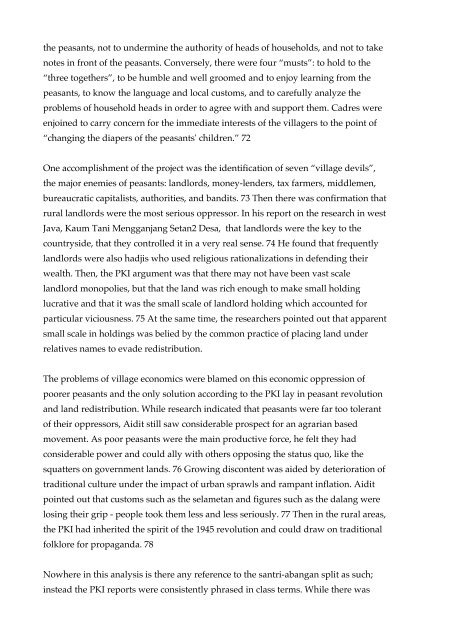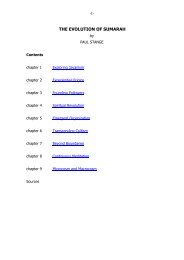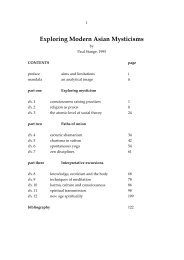Javanese Mystical and Marxist Dialectics - Paul Stange
Javanese Mystical and Marxist Dialectics - Paul Stange
Javanese Mystical and Marxist Dialectics - Paul Stange
Create successful ePaper yourself
Turn your PDF publications into a flip-book with our unique Google optimized e-Paper software.
the peasants, not to undermine the authority of heads of households, <strong>and</strong> not to takenotes in front of the peasants. Conversely, there were four “musts”: to hold to the“three togethers”, to be humble <strong>and</strong> well groomed <strong>and</strong> to enjoy learning from thepeasants, to know the language <strong>and</strong> local customs, <strong>and</strong> to carefully analyze theproblems of household heads in order to agree with <strong>and</strong> support them. Cadres wereenjoined to carry concern for the immediate interests of the villagers to the point of“changing the diapers of the peasants' children.” 72One accomplishment of the project was the identification of seven “village devils”,the major enemies of peasants: l<strong>and</strong>lords, money-lenders, tax farmers, middlemen,bureaucratic capitalists, authorities, <strong>and</strong> b<strong>and</strong>its. 73 Then there was confirmation thatrural l<strong>and</strong>lords were the most serious oppressor. In his report on the research in westJava, Kaum Tani Mengganjang Setan2 Desa, that l<strong>and</strong>lords were the key to thecountryside, that they controlled it in a very real sense. 74 He found that frequentlyl<strong>and</strong>lords were also hadjis who used religious rationalizations in defending theirwealth. Then, the PKI argument was that there may not have been vast scalel<strong>and</strong>lord monopolies, but that the l<strong>and</strong> was rich enough to make small holdinglucrative <strong>and</strong> that it was the small scale of l<strong>and</strong>lord holding which accounted forparticular viciousness. 75 At the same time, the researchers pointed out that apparentsmall scale in holdings was belied by the common practice of placing l<strong>and</strong> underrelatives names to evade redistribution.The problems of village economics were blamed on this economic oppression ofpoorer peasants <strong>and</strong> the only solution according to the PKI lay in peasant revolution<strong>and</strong> l<strong>and</strong> redistribution. While research indicated that peasants were far too tolerantof their oppressors, Aidit still saw considerable prospect for an agrarian basedmovement. As poor peasants were the main productive force, he felt they hadconsiderable power <strong>and</strong> could ally with others opposing the status quo, like thesquatters on government l<strong>and</strong>s. 76 Growing discontent was aided by deterioration oftraditional culture under the impact of urban sprawls <strong>and</strong> rampant inflation. Aiditpointed out that customs such as the selametan <strong>and</strong> figures such as the dalang werelosing their grip - people took them less <strong>and</strong> less seriously. 77 Then in the rural areas,the PKI had inherited the spirit of the 1945 revolution <strong>and</strong> could draw on traditionalfolklore for propag<strong>and</strong>a. 78Nowhere in this analysis is there any reference to the santri-abangan split as such;instead the PKI reports were consistently phrased in class terms. While there was




